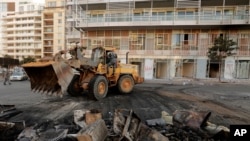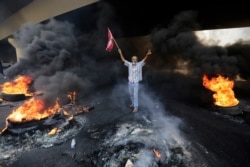The Lebanese army moved to end two days of protests against tax increases and alleged official corruption Saturday as the government fractured over promised economic reforms.
Major highways that had been blocked by protesters were reopened by the troops.
The Internal Security Forces said 70 protesters were arrested.
Lebanon’s Prime Minister Saad Hariri gave his government partners three days to support a reform drive as thousands of protesters crowded the streets across the country amid an economic crisis.
Protesters had massed outside Hariri’s office as the visibly frustrated prime minister gave an address to the nation, in which he blamed political foes he says have blocked his reform proposals.
Protesters Friday pelted riot police with rocks and tomatoes as police fired back with tear gas and water cannon to try to disperse the angry crowds. Demonstrators called on the government to step down, and some chanted the Arab Spring slogan of “the people want to topple the government.”
The demonstrators have been making their presence felt in streets across the country, following efforts by the government to begin taxing Whatsapp text messages, amid an increasingly dire economic situation because of massive government debt and insufficient revenues to continue funding government operations.
Banks, schools and many businesses were closed Friday as the rallies spread throughout the country, leaving parts of Beirut littered with burning tires, trash and broken glass.
Hariri gave his government partners 72 hours to determine what to do and called for a solution that cuts waste and corruption. If no agreement is reached, he said he may need to resort to another solution, without specifying what that would be.
He said he has spent the last four years “running from capital to capital,” and devising “plans to raise revenues and cut costs,” but being frustrated at each turn by political forces who block all of them.
Protests began spreading across Lebanon late Thursday after word spread the government was hoping to tax mobile phone text messages. Many Lebanese have family members abroad and taxing phone messages would hit just about everyone.
The government scrapped the proposed tax within hours.
Protesters also are demanding that politicians be prosecuted for years of corruption.
Hilal Khashan, who teaches political science at the American University of Beirut, told VOA that “the corrupt ruling elite has squandered many billions of dollars of public assets and accumulated unprecedented debt relative to the small size of the economy. Years of runaway embezzlement of public funds,” he argues, “has finally taken its toll.”










